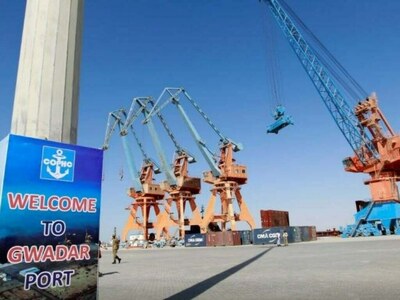Federal Minister Urges Fast-Tracking of ML-4 Railway and Gwadar Mining Port Development
ISLAMABAD: Ahsan Iqbal, the Federal Minister for Planning, Development, and Special Initiatives, has instructed officials to expedite the ML-4 railway project. He also advocated for the establishment of Gwadar as a specialized port for mining operations, equipped with the necessary infrastructure for handling ore to bolster Balochistan’s mining sector.
The minister issued these directives while presiding over a significant review session of the Prime Minister’s Committee focused on making the Gwadar Port fully operational.
The central aim of the gathering was to evaluate the current advancements and finalize a collaborative strategy to ensure the port’s efficient operational readiness. The meeting saw participation from Federal Minister for Maritime Affairs Muhammad Junaid Anwar, Infrastructure Member Waqas Anwar, alongside top-level representatives from the Ministries of Foreign Affairs, Interior, Maritime Affairs, Industries, Commerce, as well as relevant provincial bodies.
The minister highlighted the significance of maintaining consistent project leadership and tasked the provincial government with assigning dedicated and skilled project directors to prevent any administrative hold-ups.
Infrastructure Member Waqas Anwar provided the forum with a briefing on the progress of previously agreed decisions, which was followed by updates from the respective ministries.
The significance of incorporating local communities, especially those involved in fishing, into the economic structure being built around Gwadar was emphasized by the minister. He stressed that development initiatives must not alienate the local populace, ensuring that their livelihoods are safeguarded alongside any foreign investments.
He suggested integrating the fishing industry and the broader Blue Economy with national initiatives, such as the Uraan Pakistan Export Enhancement Strategy. Moreover, he directed that a complete business strategy for Gwadar should be created through the engagement of competent consultants possessing the necessary sector-specific knowledge.
Emphasizing Gwadar’s close proximity to Muscat, approximately a 12-hour sea journey, he reiterated the strategic benefit of creating a Pakistan-GCC trade route via the Gwadar-Muscat maritime corridor. He highlighted the necessity for a comprehensive strategy involving road, rail, and port connections to foster trade and economic alliances within the region.
Ahsan Iqbal emphasized the prompt finalization of vital infrastructure projects, notably the N-85 and the Coastal Highway, to facilitate logistics and enhance accessibility to the port. He noted that ensuring operational infrastructure and a secure setting is crucial before hosting investment conferences or inviting international delegations. Furthermore, he reviewed the advancement of the Safe City Project in Gwadar, instructing the Ministry of Interior and the Balochistan government to guarantee its timely execution.
Regarding urban planning, the minister assessed the existing Gwadar Urban Development Plan and instructed the concerned authorities to formulate and present an updated PC-1 to the CDWP. He also requested the additional chief secretary of Balochistan to provide the federal government with provincial development plans to align them with the wider goals of the Uraan Pakistan framework.
Addressing the delays in land allocation, the minister pointed out that the port’s 40-year development agreement should only be enacted once the land is formally transferred. He voiced his concerns over the decade-long delay in this process, urging for an immediate resolution in the country’s best interests.
To attract foreign investment, the minister suggested establishing a secure residential zone for international personnel and visitors, drawing inspiration from models like Sharm El Sheikh and Dammam. He advocated for the creation of tourism infrastructure in Gwadar, which includes coastal resorts, and encouraged international hospitality brands to invest there. He also proposed a comparative study of Gwadar’s infrastructure with other regional ports like Sohar and Jebel Ali to inform policy choices and improve competitiveness.
The government’s agenda from 2025 to 2027 includes prioritizing engagement with Afghan transit traders to enhance trade with Central Asian Republics, conducting feasibility assessments for roll-on/roll-off (RO-RO) terminals, and holding discussions with major global shipping firms such as COSCO, CMA, and CGM. Enhancements to infrastructure via the M-8 Motorway, Eastbay Expressway, and ML-4 are also integral to this strategic plan.
The minister affirmed that inclusive development must remain at the core of all endeavors and that the local fishing community should remain involved via established platforms. He acknowledged the ongoing initiatives to harmonize provincial aquaculture strategies from Sindh and Balochistan with national objectives and the development of maritime sector capabilities, as part of Uraan Pakistan.



Comments (0)
No comments yet. Be the first to comment!
Leave a Comment